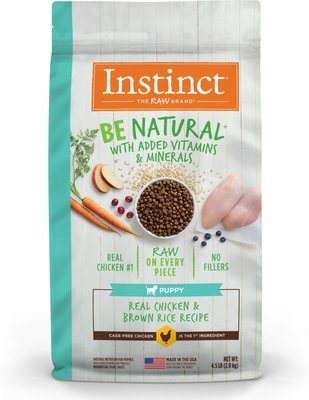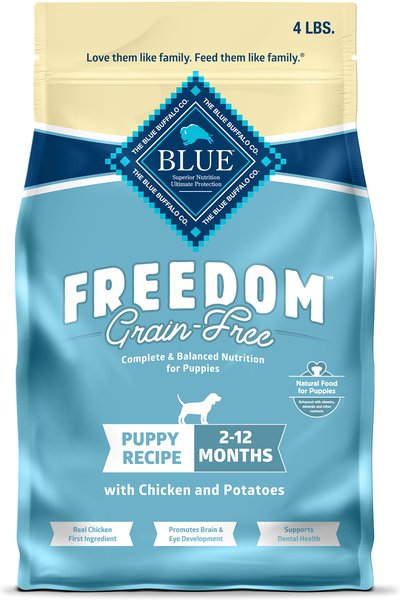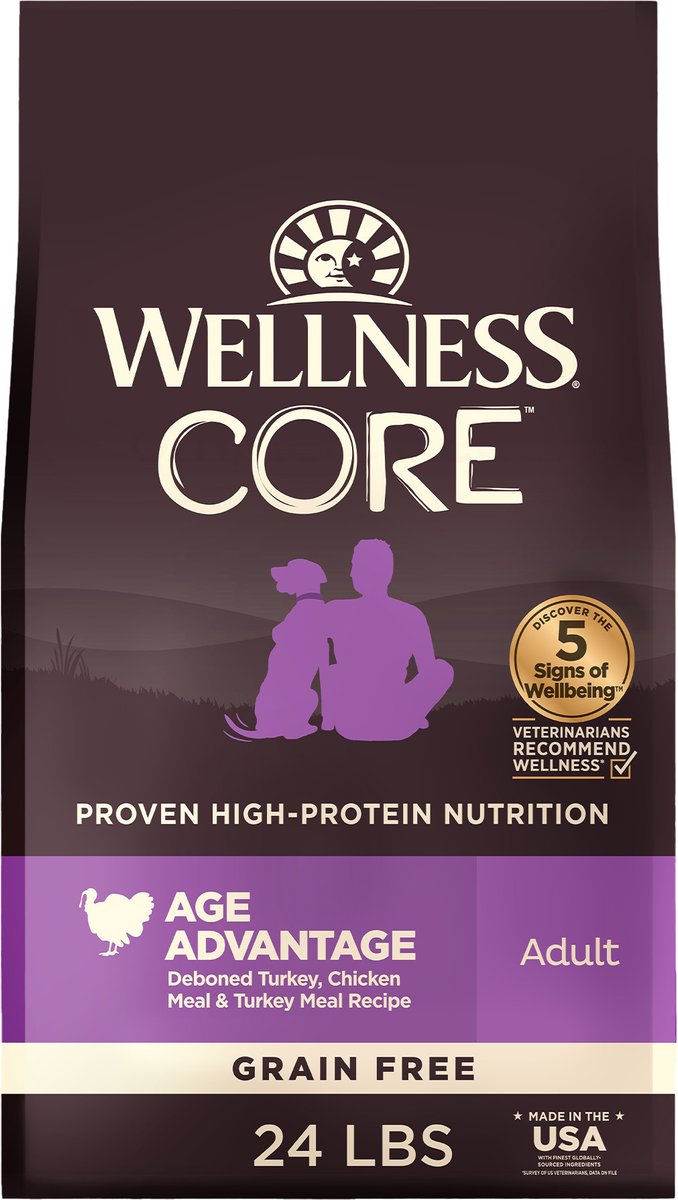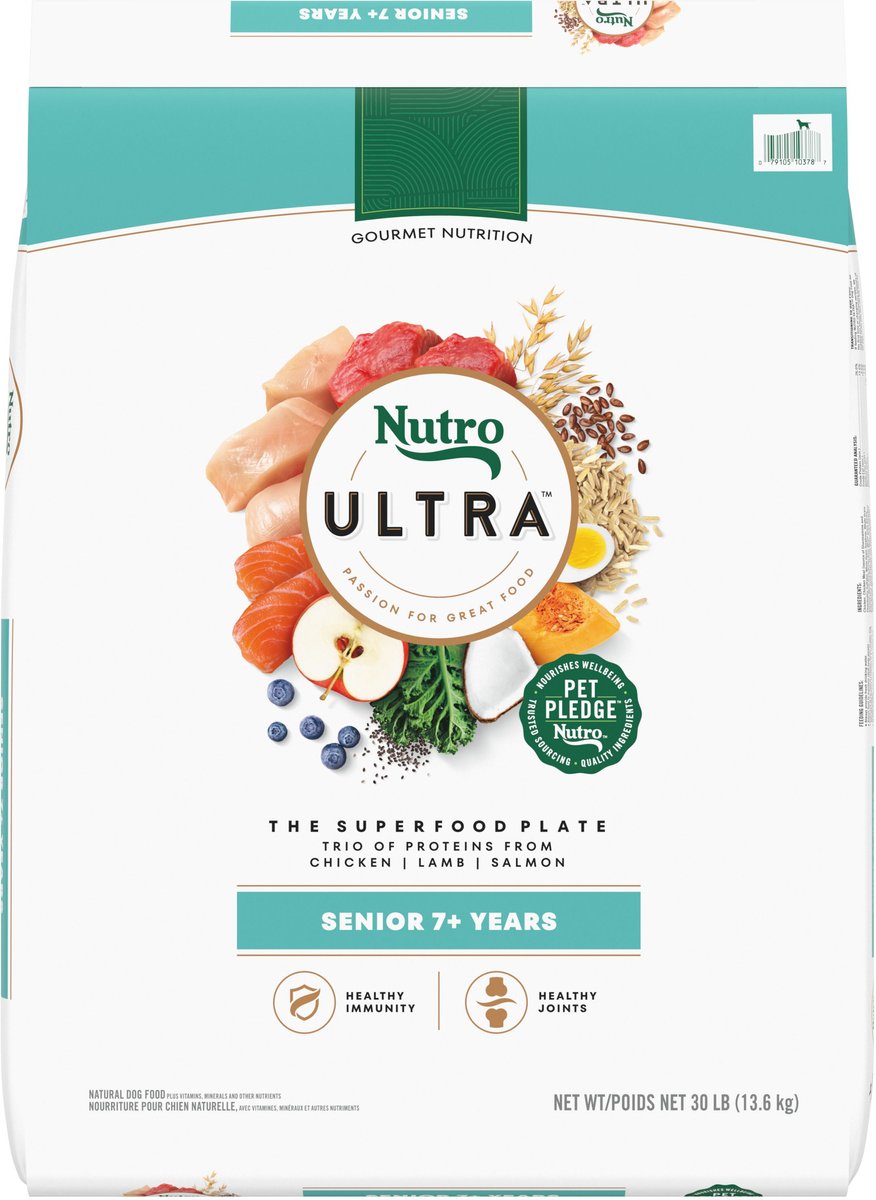What are the Best Dog Foods for Bernese Mountain Dogs?

The Bernese Mountain Dog is a loyal, affectionate friend. A breed that bonds deeply with its family, keeping the Bernese Mountain Dog in good physical condition is a high priority for every owner of this charming dog type. Whether you share your home with a puppy, a mature adult, or a senior, our list of top quality diets will help you select the right food to fuel your Bernese Mountain Dog’s health and lifestyle.
Jump to section
Breed Info
Breed Group:Working | AKC Bernese Mountain Dog Profile
Ideal Weight:Female Adult: 73 to 92 pounds
Male Adult: 86 to 109 pounds
Exercise Need:20 to 40 minutes per day
Breed Summary
A working breed that hails from Switzerland, the Bernese Mountain Dog is a delightful family companion. Its original purpose included herding livestock, pulling carts, and keeping watch over its family’s home and hearth; jobs at which this dog type excelled.
The Bernese Mountain Dog takes its name from a small village known as Bern where the breed was developed. This dog is easily recognizable by its beautiful tri-colored coat that is predominantly black in color. Its chest prominently displays a white marking commonly referred to as the “Swiss cross.”
Affectionately nicknamed the “Berner,” this beloved dog type is substantial in size but is friendly by nature. A breed that is not known for excessive hyperactivity, the Bernese Mountain Dog is a laidback creature that enjoys an active lifestyle whether it is involved in dog sports, conformation events, working trials, or simply enjoying hikes with its family.
This breed is well renowned for its intelligence and willingness to learn new things. However, the Bernese Mountain Dog has energy to spare, and if not properly exercised on a daily basis, can become overly exuberant.
The Bernese Mountain Dog loves to use its voice and finds great pleasure in chasing after small creatures such as squirrels, chipmunks, groundhogs, and even cats. A large dog, the Bernese Mountain Dog is unaware of its size, often playing too rough for children or small animals.
Fun fact: The Bernese Mountain Dog is an ancient breed, tracing its roots to over 2000 years ago when it is believed the Romans brought the earliest prototypes of the dog to the Alps in Switzerland.
Physical Traits
Strong, energetic, sturdy, active, muscular
Personality Traits
Friendly, loyal, intelligent, gentle, playful
Health Considerations
-
To help determine which food is ideal for a Bernese Mountain Dog, it is always wise to consider the dog’s age, activity level, and health problems that can be common to the breed. Since Bernese Mountain Dogs are a working breed, they are highly active, making weight gain of no concern to owners of this distinguished looking pooch.
every dog breed is predisposed to certain illnesses that are common to that particular dog type. Among the health issues that can affect the Bernese Mountain Dogs are cancer, hip dysplasia, progressive retinal atrophy (pra), panosteitis, and portosystemic shunt. -
Cancer
A breed with a heartbreakingly short life expectancy, Bernese Mountain Dogs are genetically predisposed to a number of different cancers. These can greatly abbreviate the dog’s life and may affect the dog at a very young age. Many types of cancers respond favorably to dietary changes.
-
Eye Health & Progressive Retinal Atrophy (PRA)
Progressive retinal atrophy (pra) is a disorder that affects the eyes. This condition occurs when the retina begins to degrade, affecting the vision of the dog. It is most commonly diagnosed when the dog loses its ability to see when it is dark outdoors. Over time, affected dogs lose their sight entirely. Supporting healthy vision is a vital help to stave off the effects of this condition. To assist with this, we recommend the following nutrients:
Recommendations:
Anthocyanins・ Astaxanthin・ Beta-carotene・ Carotenoids・ Glutathione・ Lutein・ Lycopene・ Omega-3 essential fatty acids・ Phytonutrients・ Vitamin A・ Vitamin C -
Hip Dysplasia and Arthritis
hip dysplasia is a genetic disease typically inherited from one or both of a dog’s parents. This is seen when the hip bone does not fit within the socket correctly, causing bone to rub against bone. Hip dysplasia is extremely painful and often leads to lameness. arthritis is a common by-product for dogs suffering from hip dysplasia. In severe cases, surgery may be an option to provide relief. Maintaining a healthy body weight is an important component of not exacerbating the pain caused by this condition. To help support healthy hip function, we recommend foods that contain the following ingredients:
Recommendations:
Antioxidants・ Chondroitin・ Glucosamine・ Green Mussel・ Methylsulfonymethane・ Omega-3 from Fish Oil・ Taurine・ Turmeric・ Vitamin E -
Panosteitis
Panosteitis, an ailment sometimes referred to simply as pano, is a type of lameness that restricts a dog’s ability to move freely. It most commonly appears between ages five to 12 months and is first evidenced by limping that affects only one leg. Though this condition is not life threatening, rest and limited activity may be required for optimal health and freedom from discomfort and pain. Diet can greatly aid with this condition.
-
Portosystemic Shunt
Bernese Mountain Dogs can be predisposed to a health problem known as portosystemic shunt. When this occurs, blood vessels transport blood past the liver, leading to blood that is not properly cleaned of toxins. Symptoms of the condition most commonly surface prior to age two. Portosystemic shunt can result in such symptoms as unusual behavior, poor appetite, hypoglycemia, drug intolerance, poor growth, and both gastrointestinal and urinary problems.
Get a tailored nutrition profile for your dog
Our free nutritional assessment tool provides individualized recommendations based on your dog's breed characteristics, age, weight, body condition score, and activity level. It only takes 30 seconds to receive science-based insights to support your dog's lifelong health.
Are Fresh Food Diets Good for Bernese Mountain Dogs?
Only if they’re properly balanced.
Many well-intentioned Bernese Mountain Dogs parents spend a lot of time preparing meals at home, but health benefits are lost if meals aren’t properly portioned and balanced with all the nutrients dogs need. Recently, a few companies have done an excellent job ensuring accurate portions and nutrient balance by delivering pre-prepped fresh meals customized to the size and needs of your dog. Farmer’s Dog, Ollie and Nom Nom have each been approved by our nutrition team as delivering truly quality and well-balanced meals. They can be a little expensive (usually 3-4x more per day than kibble), but many find the added health benefits worth the cost. They do offer discounts to new customers, though, if you’d like to try one out.
Pros and Cons of Fresh Food Diets
✓ Diets balanced by Nutritionists・ ✓ Customized portions for weight control・ ✓ Superior digestive and immune health ・✕ More expensive than standard dog food
Foods We Recommend for Bernese Mountain Dogs Puppies
How long do Bernese Mountain Dogss need puppy food?
Until they're 12 to 16 months old.
Bernese Mountain Dogs are very focused on growing, and how we feed them should help them do just that. Since they have so much growing to do, they need higher amounts of nutrients than adult dogs, especially proteins, fats, carbohydrates, vitamins, minerals and — don’t forget — water. It’s still important to not overfeed puppies, so make sure to portion food and keep treats to no more than 10% of their caloric intake. Since balance is so important, we recommend that your young Bernese Mountain Dogs is eating food that is made just for puppies from a reputable brand.
Find the best nutritional start for your puppy
Our recommendation tool evaluates your puppy’s breed, age, growth stage, lifestyle, and health needs to identify a scientifically appropriate diet from over 10,000 options. Obtain personalized guidance to help support healthy development and lifelong wellness.
Foods We Recommend for Bernese Mountain Dogs Adults
When should Bernese Mountain Dogs start transitioning to adult food?
When they're 12 to 16 months old
From a nutrition standpoint, Bernese Mountain Dogs become adults once they reach about 90% of their expected weight. Once adults, our two key nutrition goals are balance and maintenance. We want balance because a dog’s body is responsible for a lot of things, like digestion, fighting infection, keeping muscles strong, and chasing squirrels. These are all important tasks, so we want to make sure each body function gets its share of nutrients. We also need to maintain a healthy weight. Underfed dogs are at risk for malnourishment, and overfed dogs can become obese — both of which lead to even worse problems for a Bernese Mountain Dog
Find the optimal nutrition plan for your adult dog
Our assessment analyzes your dog’s breed, age, lifestyle, and health considerations to recommend a scientifically selected diet from over 10,000 options. Personalized insights to help your dog thrive through adulthood.
Foods We Recommend for Bernese Mountain Dogs Seniors
When should Bernese Mountain Dogs start transitioning to senior food?
All dogs can age differently, but large dogs like Bernese Mountain Dogs can start to benefit from senior food around 6 to 8 years old
Ever watch kids running around the playground and wish you had that energy again? Yeah. Dogs get there, too. The metabolic processes in senior Bernese Mountain Dogs slow down as they age, which often means they aren’t needing quite as many calories as they did in their prime. Smart dog food companies have formulated senior diets to ease up on calories but still help them feel full and give them adequate maintenance protein. Still, like humans, everybody is different. Sometimes older dogs need just as many calories, or more, depending on how their bodies progress. So keep a close eye on their body condition, and look for dog foods made for seniors.
Support your senior dog's health with targeted nutrition
Our assessment analyzes your dog’s breed, age, and health considerations to recommend a science-based diet from over 10,000 options. Help maintain mobility, cognitive health, and quality of life.
Affiliate Disclosure:
We do not accept money to recommend pet foods. However, we do receive referral fees from online retailers (such as Chewy or Amazon) on qualifying purchases. Our recommendations are neutral, and diet recommendations are made without considering whether we will receive a referral fee.















